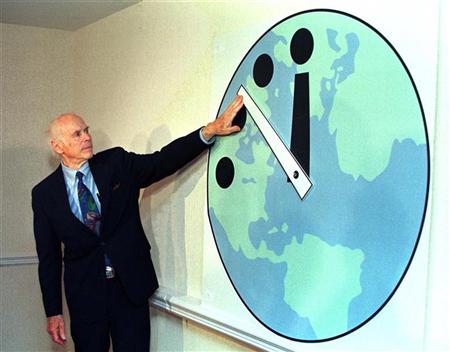Humans have always had a fascination with apocalyptic scenarios. Ten years ago, we waltzed through the Y2K doomsday scare, but human nature lives on, as reported in this New York Times story:
KNOWING our computers is difficult enough. Harder still is to know ourselves, including our inner demons. From today’s perspective, the Y2K fiasco seems to be less about technology than about a morbid fascination with end-of-the-world scenarios. This ought to strike us as strange. The cold war was fading in 1999, we were witnessing a worldwide growth in wealth and standards of living, and Islamic terrorism was not yet seen as a serious global threat. It should have been a year of golden weather, a time for the human race to relax and look toward a brighter, more peaceful future. Instead, with computers as a flimsy pretext, many seemed to take pleasure in frightening themselves to death over a coming calamity.
No doubt part of the blame must go to those consultants who took businesses and governments for an expensive ride in the lead-up to New Year’s Day. But doom-laden exaggerations about Y2K fell on ears that were all-too receptive. The Y2K fiasco was about more than simple prudence.
Religions from Zoroastrianism to Judaism to Christianity to U.F.O. cults have been built around notions of sin and the world’s end. The Y2K threat resonated with those ideas. Human beings have constructed an enormous, wasteful, unnatural civilization, filled with sin — or, worse in some minds, pollution and environmental waste. Suppose it turned out that a couple of zeros inadvertently left off old computer codes brought crashing down the very civilization computers helped to create. Cosmic justice!
The theme of our fancy inventions ultimately destroying us has been a favorite in fiction at least since Mary Shelley’s “Frankenstein.” We can place alongside this a continuous succession of spectacular films built on visions of the end of the world. Such end-time fantasies must have a profound, persistent appeal in order to keep drawing wide-eyed crowds into movie theaters, as historically they have drawn crowds into churches, year after year.
Apocalyptic scenarios are a diversion from real problems — poverty, terrorism, broken financial systems — needing intelligent attention. Even something as down-to-earth as the swine-flu scare has seemed at moments to be less about testing our health care system and its emergency readiness than about the fate of a diseased civilization drowning in its own fluids. We wallow in the idea that one day everything might change in, as St. Paul put it, the “twinkling of an eye” — that a calamity might prove to be the longed-for transformation. But turning practical problems into cosmic cataclysms takes us further away from actual solutions.




No comments:
Post a Comment